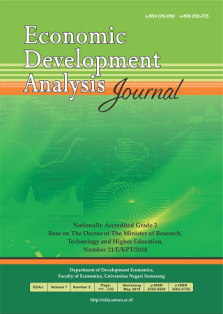Economic Complexity and Sustainable Growth in Developing Countries
Abstract
Most developing countries in this study are middle to low-income countries that have a relatively low economic complexity. This study aims to analyze the effect of the economic complexity on economic growth in 86 developing countries in 2010-2019. The method used is the Generalized Method of Moments (GMM) to capture dynamic panel analysis. The estimation results using the System GMM show that economic complexity has a positive effect on economic growth in developing countries. Increasing economic complexity encourages a structural transformation through high value-added economic sectors' creation to produce more complex products for earning a higher income. Human capital does not have a significant effect on economic growth because developing countries have relatively low-quality workers both in terms of education and health. The human capital development and government spending on the health sector are necessary to accelerate sustainable economic growth.


